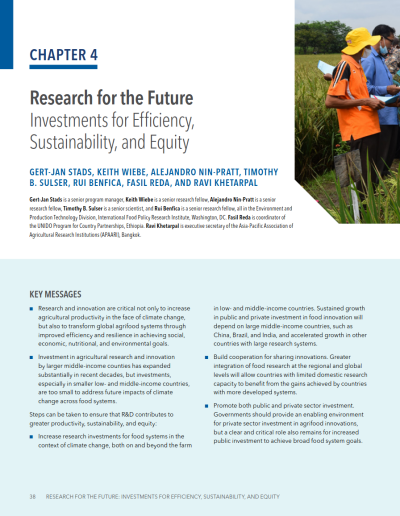Authors:
Gert-Jan Stads, Keith Wiebe, Alejandro Nin-Pratt, Timothy B. Sulser, Rui Benfica, Fasil Reda, and Ravi Khetarpal
Year:
2022
Publisher
International Food Policy Research Institute (IFPRI)
Further information
Back to:
Research and innovation are critical not only to increase agricultural productivity in the face of climate change, but also to transform global agrifood systems through improved efficiency and resilience in achieving social, economic, nutritional, and environmental goals.
Investment in agricultural research and innovation by larger middle-income counties has expanded substantially in recent decades, but investments, especially in smaller low- and middle-income countries, are too small to address future impacts of climate change across food systems.
Steps can be taken to ensure that R&D contributes to greater productivity, sustainability, and equity:
- Increase research investments for food systems in the context of climate change, both on and beyond the farm in low- and middle-income countries. Sustained growth in public and private investment in food innovation will depend on large middle-income countries, such as China, Brazil, and India, and accelerated growth in other countries with large research systems.
- Build cooperation for sharing innovations. Greater integration of food research at the regional and global levels will allow countries with limited domestic research capacity to benefit from the gains achieved by countries with more developed systems.
- Promote both public and private sector investment. Governments should provide an enabling environment for private sector investment in agrifood innovations, but a clear and critical role also remains for increased public investment to achieve broad food system goals.

